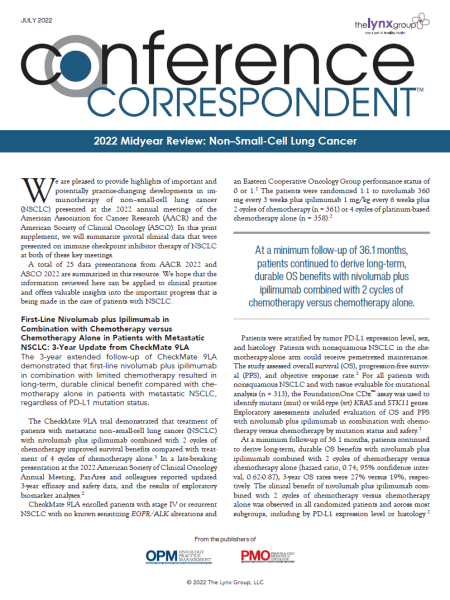RET (rearrangement during transfection) rearrangements occur in 1% to 2% of cases of non–small-cell lung cancer (NSCLC).1 The effects of multitarget kinase inhibitors have been shown to be limited.1 Consequently, a number of selective next-generation RET inhibitors are under investigation. Retevmo (selpercatinib; Eli Lilly) is a highly selective tyrosine kinase inhibitor approved under an accelerated approval and indicated for adult patients with metastatic RET fusion–positive NSCLC.2 Continued approval may be contingent upon confirming clinical benefit in clinical trials.
Selpercatinib is being studied in the ongoing LIBRETTO-001 trial (NCT03157128) that includes 105 patients with RET fusion–positive NSCLC who have metastatic disease.2 Patients were previously treated with platinum-based chemotherapy and were treated with a median of 3 previous systemic regimens2; 55% of patients had previously been treated with anti–PD-1 or PD-L1 therapies and 48% had been pretreated with ≥1 multikinase inhibitors.3 The median age of enrolled patients is 61 years.2 The overall response rate (ORR) is 64% (95% confidence interval [CI], 54%-73%),2 which was similar regardless of previous treatment.3 The median duration of response (DOR) is 17.5 months (95% CI, 12-not estimable [NE]).2 At baseline, 11 patients had central nervous system metastases, and the ORR is 91% (95% CI, 59%-100%) among these patients.2,3 The study has also included 39 patients who are treatment-naïve.2 Among this subpopulation, the ORR is 85% (95% CI, 70%-94%), and the median DOR is not estimable. The safety analysis of selpercatinib includes 702 patients, 65% of whom have been exposed for ≥6 months and 34% of whom have been exposed for >1 year. Serious adverse events have occurred in 33% of patients, 5% of patients permanently discontinued related to an adverse reaction, 42% have required dosage interruption, and 31% have had a dose reduction. The most commonly reported adverse events that have occurred in >15% of patients have included dry mouth, diarrhea, constipation, nausea, abdominal pain, hypertension, fatigue, edema, rash, headache, cough, dyspnea, and prolonged QT interval. The most common grade ≥3 adverse events have been diarrhea (3.4%), hypertension (18%), and prolonged QT interval (4%).
Pralsetinib is a recently approved RET inhibitor that was being studied in a phase 1/2 dose-escalation and expansion study (NCT0307385) of 132 of 354 patients with locally advanced or metastatic NSCLC with RET fusion or mutation.4 The median age of participants was 60 years, and approximately 42% had brain metastases. Previous treatment regimens included chemotherapy (71%), PD-L1 inhibitor (36%), and chemotherapy plus PD-L1 inhibitor (31%). Of patients with evaluable response (N = 116), the ORR was 57% (95% CI, 46%-68%), including 6% with a complete response, and the effects occur regardless of previous therapies. The median DOR was not reached (95% CI, 15.2 months-NE). Among 27 treatment-naïve patients, the ORR is 70% (95% CI, 50%-86%) with 11% experiencing a complete response.4
Pralsetinib is well-tolerated, and the most commonly reported adverse events that have occurred in >25% of patients have included fatigue, constipation, musculoskeletal pain, and hypertension. Grade ≥3 adverse events occurred in 2.5% of patients.4 Pralsetinib is also being studied in an ongoing phase 3, open-label, randomized study (NCT04222972) of 250 patients with advanced or metastatic NSCLC who have had no previous treatment for metastatic disease.5 Patients are being randomized to either pralsetinib or platinum-based chemotherapy ± pembrolizumab (Keytruda; Merck). The primary end point is progression-free survival, and secondary end points include ORR, overall survival, safety/tolerability, clinical benefit and disease control rate, DOR, and time to intracranial progression and response rate.5
In summary, the study results of selpercatinib and pralsetinib are encouraging for patients with RET-rearranged NSCLC and are clearly an advance over multikinase inhibitors.
References
- Ackermann CJ, Stock G, Tay R, et al. Targeted therapy for RET-rearranged non-small cell lung cancer: clinical development and future directions. Onco Targets Ther. 2019;12:7857-7864.
- Retevmo (selpercatinib) capsules, for oral use [package insert]. Indianapolis, IN: Eli Lilly and Company; May 2020.
- Eli Lilly and Company. Lilly announces positive results for selpercatinib (LOXO-292), demonstrating a 68 percent objective response rate and sustained durability in heavily pretreated RET fusion-positive non-small cell lung cancer. September 9, 2019. https://investor.lilly.com/news-releases/news-release-details/lilly-announces-positive-results-selpercatinib-loxo-292. Accessed July 30, 2020.
- GAVRETO™ (pralsetinib) Prescribing Information (US). Blueprint Medicines Corporation, Cambridge, Massachusetts, USA; September 2020.
- Besse B, Felip E, Clifford C, et al. AcceleRET lung: a phase 3 study of first-line pralsetinib in patients with RET fusion+ advanced/metastatic non-small-cell lung cancer (NSCLC). J Clin Oncol. 2020;38(suppl 15). Abstract TPS9633.

